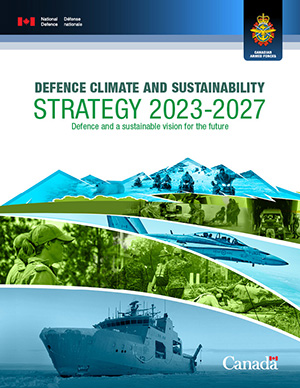Defence Climate and Sustainability Strategy 2023-2027
 Defence Climate and Sustainability Strategy 2023-2027
Defence Climate and Sustainability Strategy 2023-2027[PDF - 11.6 Mb]
Defence and a sustainable vision for the future
Table of Contents
- Introduction
- Climate Action
- Environmental Sustainability
- Moving Forward
Message from the Minister
I am pleased to present the Defence Climate and Sustainability Strategy 2023-2027 (DCSS). The DCSS provides an account of National Defence and the Canadian Armed Forces’ (CAF) activities and contributions to support sustainable development, reduce our environmental impact, and adapt to the defence and security implications of climate change.
Through the DCSS, we continue to support the Government of Canada’s commitment in the Federal Sustainable Development Act, the Federal Sustainable Development Strategy (FSDS), the Greening Government Strategy (GGS), and Canada’s Federal Implementation Plan for the 2030 Agenda, which supports the 2030 United Nations (UN) Agenda for Sustainable Development.
At Defence, we recognize the many impacts climate change has on Canadians and our economy. We are committed to supporting a green economy and green jobs by investing in energy-efficient military equipment and infrastructure upgrades. We continue to partner with industry to reduce the environmental impact of our operations and create economic opportunities across Canada.
Climate change also has real impacts on people’s lives and our communities. The rising frequency and severity of natural disasters and extreme weather events are increasing demands on the CAF, which is called on as a last resort to assist communities when they need it most. We continue to work with our government partners and local authorities to provide support for Canadians, especially those most vulnerable in times of crisis. Managing the increase in such calls has implications for Canada’s security and defence, at home and abroad. Climate change also has geopolitical implications, so it is critical that we adapt to our changing environment while mitigating the impact of our defence activities.
Across our great country, we remain committed to strengthening our relationships with Indigenous peoples, especially in communities where we operate. With open dialogue, the Defence Team, which includes National Defence and the CAF, will continue to regularly engage First Nations, Inuit, and Métis governing bodies and organizations on our planned projects, training exercises and military activities, particularly when they could affect Indigenous rights, lands and water. This supports Canada’s United Nations Declaration on the Rights of Indigenous Peoples Act Action Plan.
Moving forward, alongside our allies and partners, we will continue to address the defence and security impacts of climate change. To this end, Montréal, Que., will become the host city for the NATO Climate Change and Security Centre of Excellence, an initiative led jointly by Global Affairs Canada and National Defence.
Continuing to work with our Allies, we look to the NATO Climate Change and Security Action Plan as a vital guide. Endorsed by Canada in March 2021, this action plan provides measures to address the impacts of climate change on security.
With the DCSS as our guide, we will work to increase sustainability across our operations, and demonstrate progress on our goals.